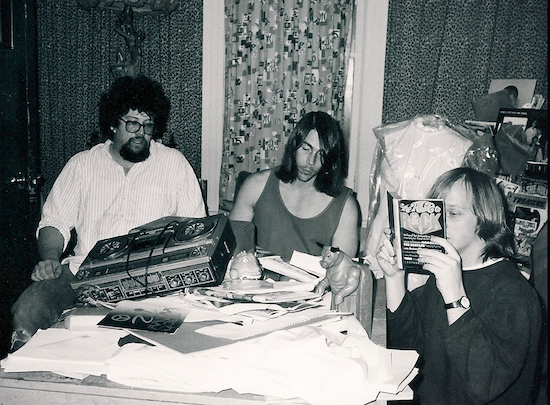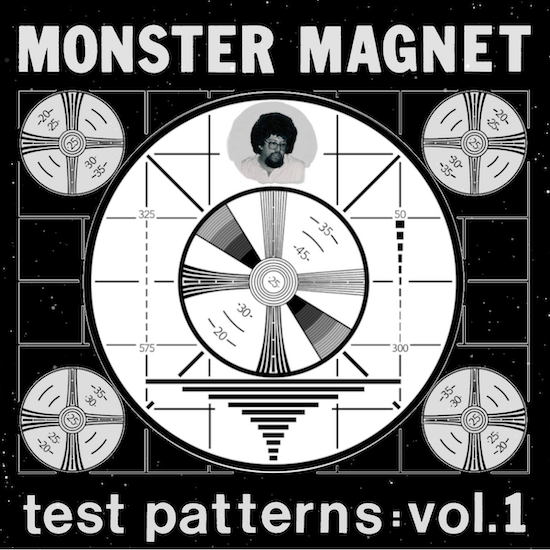One of the most frustrating things about ‘Tab’ is that Monster Magnet never recorded anything quite like it again.
Why not? Dave Wyndorf, their singer, guitarist and default leader from soon after its the release, would later explain that "jamming gets boring. People wanna hear songs". Well, the tedium aspect depends greatly on the nature and quality of the jam(s) in question. As for what audiences do — or do not — wish to hear, I’m not sure whether "people" are always the most astute judges of such matters. Sure, "people" want to hear songs. People also want to hear songs by Elbow. So what do they know? "People" enjoy watching vacuous talent competitions like The X Factor, Pop Idol and BBC Young Musician Of The Year. "People" reckon Matty Healy from The 1975 is "the voice of a generation" and if that truly is the case then maybe your generation hasn’t shown enough scepticism towards men who have their eyebrows raised in every single photoshoot. "People" say they like "good, honest food" and then, as an extension of that philosophy, vote xenophobically in national referendums. "People" log-on to social media and type oxymoronic phrases like "important thread". "People", giddy enough to believe they’re actually in love ("for, like, literally ever, yeah?") attach irremovable padlocks to scenic bridges. "PEOPLE!" as one of Reece Shearsmith’s more autobiographical creations from The League Of Gentlemen shrieked in impotent frustration, "WHAT IS WRONG WITH PEOPLE?!"
But I digress. No one’s doubting the sincerity of Dave Wyndorf or the verse-chorus inclinations of his muse. Based on Monster Magnet’s output since 1993, which has been what you’d call "song-based" but has moved up and down the barometer of experimentation within that restriction, it’d be churlish to disbelieve Wyndorf when he says "I can’t just vibe on a riff for ten minutes, you know?" In 1992, Monster Magnet signed to A&M Records and were under greater pressure to appeal to those "people" (i.e. their potential CD-buying public and members of the record company that’d market it to them) who wanted catchily composed songs rather than drugged-out freestyling. Combined with Wyndorf’s own ambitions (and, from the mid-90s, his sobriety) this would reach its commercial apogee with 1998’s Powertrip, which was a coup for this slightly tongue-in-cheek, hard-rocking, throwback-to-the-70s project. It sold very well and was named "Album Of The Year" by both Kerrang! and Metal Hammer, fighting off stiff competition from Marilyn Manson, Soulfly, Sepultura, Beastie Boys, Rob Zombie and others. Powertrip‘s success benefitted from the slick and streamlined approach of its songs and their promotional videos in which the band borrowed heavily from the aesthetics of the hip-hop and R&B videos directed by Hype Williams in order to send themselves up and knowingly acknowledge that rappers had already displaced guitar bands as the modern-day rock stars.
Years before that breakthrough moment, a change in their style, tactics and personnel had already taken place. Monster Magnet’s other founding members were John McBain and Tim Cronin, both of whom had departed by 1993’s major-label debut Superjudge. Between their first and second demo tapes, they’d added Jon Kleiman and Joe Calandra. Their first studio album, 1991’s Spine Of God on Glitterhouse Records was a scuzzy, sleazy and swirling concoction of punk, metal, garage rock and space rock. It has firmly established itself as a cult classic and one which, for purists, Monster Magnet never topped.
Also released in 1991, only in Europe, the four-song (but album-length) "EP" Tab had the inscription "This ain’t a followup. It is what it is." Its opening number, the title track, lasted for 32 minutes. It was influenced by Amon Düül II, CAN, Skullflower, Loop, Butthole Surfers, Spacemen 3 and other mavericks who took drugs to make music to take drugs to. If Sleep’s ‘Jerusalem/Dopesmoker’ was the 90s’ answer, and logical conclusion, to the blueprint provided by Black Sabbath, then ‘Tab’ was the equivalent descendent of Hawkwind.
The song had been a staple of Monster Magnet’s early sets and the epitome of their original, take-no-prisoners integrity. "Monster Magnet started as a reaction to Jersey Shore life in general," John McBain recalled in 2011. "Fuck The Boss. Fuck cover bands. People hate us already. Why not give them something to really hate? In fact our early shows were endurance contests for the audience. Many a night ended with us playing to the bartender and soundman." Such sets always culminated with, as McBain referred to it, "the unbearable ‘Tab’… because it emptied the room every time."

Photo by Glinda Wyndorf
Not exactly one for the "people" who "wanna hear songs", Test Patterns: Vol. 1 contains two versions of Monster Magnet’s singular opus. One is that which first took up the second side of the 1989 demo cassette Forget About Life, I’m High On Dope. The other is new remix of the same cut, overseen by McBain. We don’t know what the plan is for further volumes of what is presumably the Test Patterns series but you’d think those late-80s demo tapes would be worth issuing officially in full. (For the time being, you can hear the uploads on YouTube.) Although it is of course based around the same repeated, lunging riff, the demo ‘Tab’ provided on Test Patterns: Vol. 1 has a different feel to the later rendition. It was recorded as a trio who sound like they’re playing in a poorly lit basement owned by a typically amoral landlord who refuses to deal with the rising damp, dry rot and infestations of insects the size of those from Starship Troopers. The players may also have been trying to distract themselves from such desolation by being out of their minds on illegal recreationals. The drums are quite cardboardy, occasionally accompanied by what must be a rusty tambourine. The guitars scratch and sprawl like distant, stretched-out cousins of George Harrison’s backwards solo from ‘I’m Only Sleeping’. For a long time, it’s as if the band are fronted by a chanting Tibetan monk or (more realistically) somebody who’s too stoned to form any coherent phrases. After about ten minutes it’s possible to make out the words "Baby, baby, baby…", between the acid-frazzled screams. A couple of minutes later, there’s a brief attempt to tell a "messy" story. Something about kids, drugs, sex and murder. Eventually, the jam nearly ends, and then it kicks in again. Finally, it does finish with the words "Big ones, huh? Big ones. Yeah. Oh yeah", followed by one last percussive jingle. While it cannot provide the full impression of what those crowd-repelling live performances must have been like, this lo-fi offering certainly contains plenty of bug-eyed charm. To use Wyndorf’s love of comics as a metaphor, it’s like some Dan Dare-indebted, self-photocopied, biro-drawn zine that precedes the cartoonist’s later, lavish, hardback graphic novel.
Needless to say, McBain’s new mix is fuller, richer and more robustly discombobulating. It’s not as phat or long as that provided on the Tab EP but it’s crisper and heavier than the original demo, with the guitar effects made extra-celestial.
Two big ones, indeed, to soak up, savour and submerge yourself in. (If you’re that kind of person).


